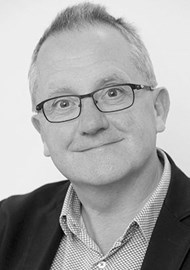David Stockdale is stepping away from the British Tinnitus Association (BTA) after 12 years, during which time the organisation has become transformed. Prof David Baguley met with David in the spring sunshine to reflect on past, present and future of the BTA, and tinnitus in general.
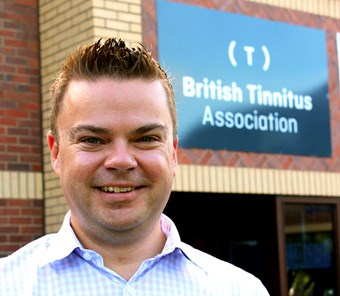
Had you heard about tinnitus before you joined the BTA as CEO?
No! it wasn’t really anything that I was aware of prior to joining the BTA. Although in my research for the role, I saw the real potential the BTA had to be an advocate for the tinnitus community and to achieve goals far greater than the sum of its parts.
What were your first impressions of the tinnitus clinician and research communities?
Very open and welcoming. There was a real passion there for a strong BTA; to act as a patient advocate, to push for better clinical services and to do this from a place of partnership and collaboration. I have always been humbled by how much support there is for the BTA from all professions.
“I see the BTA as having two key remits: supporting people to manage tinnitus well now, and pushing for progress towards a cure - or cures - for tinnitus”
I remember meeting you for the first time in your office in Addenbrooke’s along with our colleague and now friend Don McFerran and discussing our hopes for the BTA and what could be achieved in the future. A lot of water has flowed under the bridge (and a few beers!) since then but hopefully the whole community feel proud of their input into making the BTA what it is today.
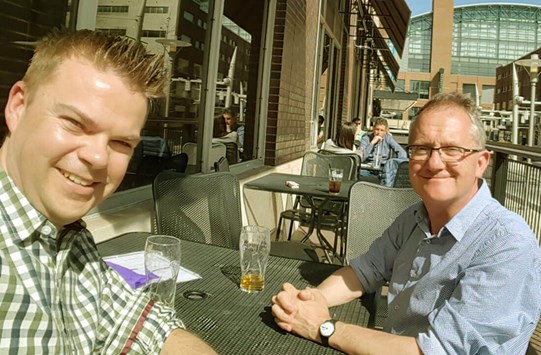
David Stockdale and David Baguley reflecting on an action-packed AAA in the Indianapolis sun in 2017.
The BTA has thrived under your leadership. What do you consider to have been your greatest triumphs?
Very kind of you to say. I like to think there have been one or two successes. I see the BTA as having two key remits: supporting people to manage tinnitus well now and pushing for progress towards a cure – or cures – for tinnitus. So, if we look at those, firstly in the support side, I was immensely proud to see us open our 100th tinnitus support group in 2018. We invested in infrastructure to encourage support groups to open in 2012, when there were just over 30 left around the UK. I believed if we put in the resource and support, we could reverse the decline and encourage groups to form and open. We knew that tinnitus could be incredibly isolating and support groups could really help.
“I was immensely proud to see us open our 100th tinnitus support group in 2018”
On the research side, it has been a much longer journey but the narrative the BTA has put together in why better management of tinnitus and ultimately a cure is needed is something I am proud of, and I am hopeful it will support the advancement of our knowledge of tinnitus at an accelerated pace. This started with us looking at the economic cost of tinnitus to the NHS and UK more broadly [1]. We then developed the “cure map” detailing tinnitus research to date, which was published in a paper you and I were co-authors of: ‘Why is there no cure for tinnitus?’ [2]. I believe this is one of the most widely read tinnitus papers of all time. It clearly set out the stall for what was needed and led the BTA to lobby government for more funding to be invested in tinnitus research. There is now a UK Government working group looking at how this can be achieved.
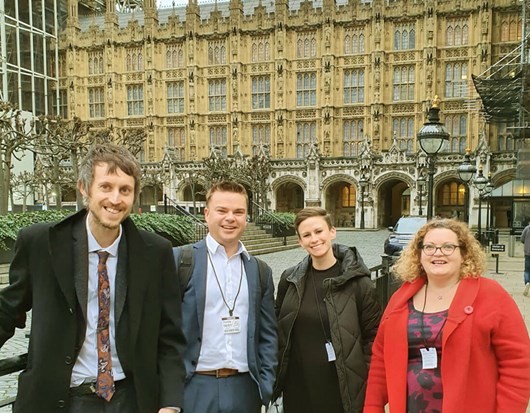
The team behind the successful BTA roundtable event at the House of Commons in January 2019.
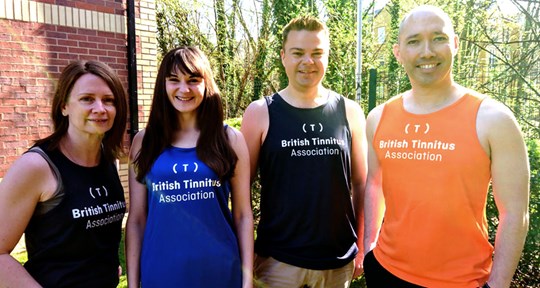
Team BTA preparing to run the York 10k to raise much-needed funds.
And any notable failures?
Ah! Yes – I think as proud as I am of our impact on research, I am leaving frustrated we couldn’t do more and have achieved what we did faster. I always hoped I was an advocate of the patient voice within the research community and sought to communicate their desperation for better management and cures. That voice needs to continue to be present and heard by the research community and acted upon. I do hope patients get the hope and progress they so desperately want in the not-to-distant future.
If there’s a young otologist or audiologist reading this, and thinking of getting involved with tinnitus work, how would you suggest they begin?
Do it! There is such an opportunity to make a difference both clinically and scientifically – it is an exciting time to be involved in the field.
References
1. Stockdale D, McFerran D, Brazier P. An economic evaluation of the healthcare cost of tinnitus management in the UK. BMC Health Serv Res 2017;17(1):577.
2. McFerran DJ, Stockdale D, Holme R. Why Is There No Cure for Tinnitus? Front Neurosci 2019;13:802.


